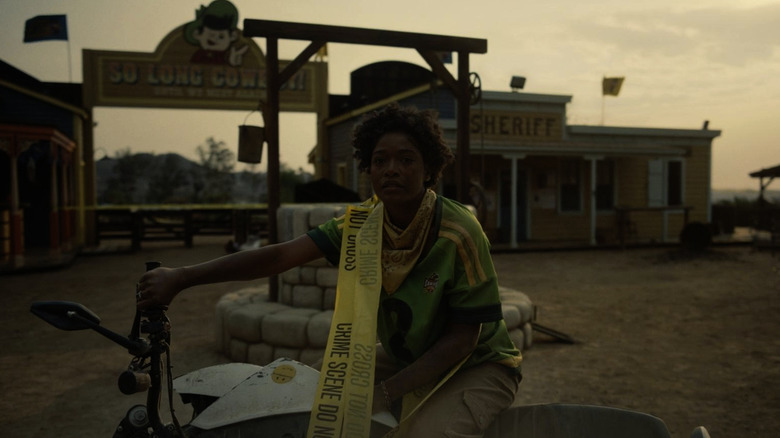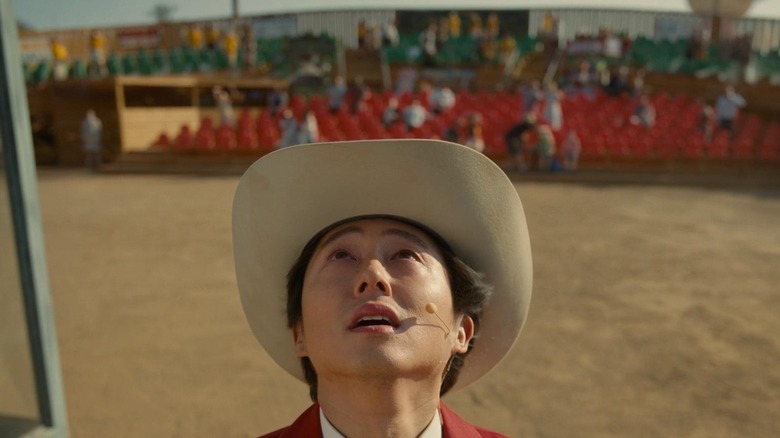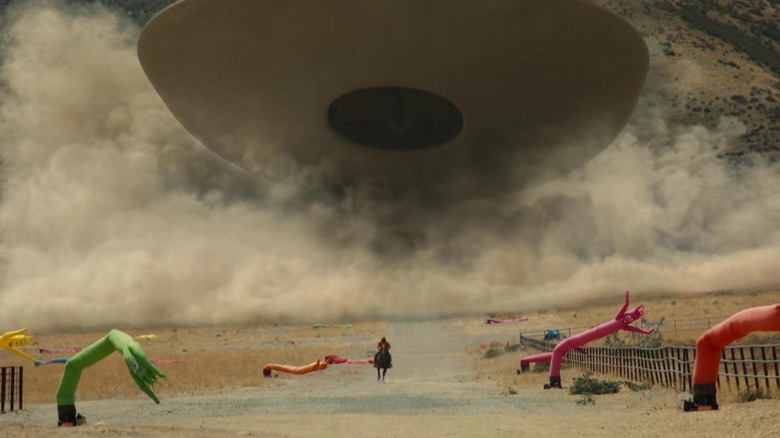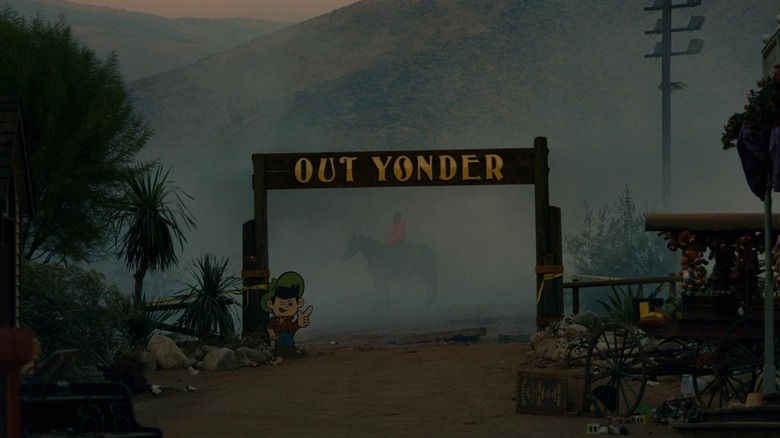How The Heck Did The 2023 Oscars Completely Ignore Jordan Peele's Nope?
When Jordan Peele's directorial debut "Get Out" managed four Oscar nominations and a win for Best Original Screenplay in 2018, it felt like an unprecedented moment for horror. Historically, the Academy often neglects horror films, along with a general distaste against genre cinema as a whole. Despite being an early 2017 release, "Get Out" was one of the most critically acclaimed films of the year and maintained its relevance throughout a particularly tough awards season — it was an unstoppable force.
Tragically, instead of changing the game, the Academy Awards success story of "Get Out" starts to feel more and more like a special anomaly with each passing year. Despite a strong campaign for Lupita Nyong'o's revelatory dual-lead performance in "Us," Peele's sophomore film tackling American individualism through the concept of the doppelgänger was fully ignored by the 2020 Academy Awards. With today's 2023 Oscars nominations, history has unfortunately repeated itself. "Nope," the biggest, most ambitious outing in Jordan Peele's career so far, did not receive a single nomination — not even any technical categories!
Where's the love for the masterful way Peele builds genuine suspense and fear? Where's the recognition for Daniel Kaluuya and Keke Palmer's grounded and thoughtful portrayal of troubled siblings? Especially in a year where "Avatar: The Way of Water" and "Top Gun: Maverick" made the Best Picture cut (possibly in an attempt to include more populist films), the lack of recognition for the critical and financial success of "Nope" feels especially bizarre.
It's frustrating, but when you take into account how staunchly anti-Hollywood the core of "Nope" is, it starts to make sense why it didn't resonate with the industry elite. The Academy Awards is built off of spectacle, and Peele's newest masterpiece argues that the desire for spectacle might be our worst human impulse.
With the Academy, it's all about the 'narrative'
If there's anything that the Academy Awards loves, it's a narrative. It's not a coincidence that so many films this year in contention were described as "love letters to cinema." After the years of isolation caused by the pandemic, this moment in Hollywood is defined by the idea of "healing." Indeed, the current trend of this year's Oscars is to reward the films that have revived moviegoing this past year or hold reverence for the theatrical experience. "Top Gun: Maverick," and "Avatar: The Way of Water" are the highest earners of the year. "The Fabelmans," "Bardo," and "Empire of Light" might not have the same money to their name, but they evoke the exact kind of spirit that the Academy thrives on. It's important to remind audiences why we love going to the movies, and it's crucial to remind artists why we create.
At first glance, "Nope" would seem to fit this category. It's a populist film that was just layered and smart enough to get high critical praise, much like "Everything Everywhere All at Once" (which to be fair, is a genre success story in its own right). As it unfolds, it also reveals itself to be a movie about movies and the act of filmmaking much like "The Fabelmans." One would think this is an instant recipe for Oscar success, except "Nope" has one important attribute that separates it from the rest of the pack and makes it unpalatable towards a narcissistic Hollywood.
Peele's love for cinema history and the act of filmmaking in his third feature film is obvious, but it's also crucially marked with cynicism. The pursuit of the "perfect shot" from OJ (Daniel Kaluuya) and Emerald (Keke Palmer) is marked with the blood of Hollywood exploitation.
The true horror of 'Nope' is Hollywood itself
"Nope" is intentionally a paradox. Shot on IMAX cameras, it is Jordan Peele's flashiest and most expensive endeavor yet, and it's designed to shock and thrill audiences alike with its fresh take on the alien invasion movie and clear Spielberg influences. While it succeeds at that in spades, it is also completely uncompromising in its direct linking of the joys of cinema to explicit suffering. Noah Jupe (Steven Yeun) is a representation of the cyclical nature of Hollywood exploitation, himself an exploited child actor who grows up to milk every bit of his image and partake in the exploitation of Jean Jacket, the floating monster at the center of "Nope," which appears as a literal, all consuming eye. Crowds of people are digested, flashbacks to an exploited monkey's violent set meltdown tie together the themes of the film.
The true horror of "Nope" is not the threat of alien invasion, but instead the cyclical wounds of an entertainment industry that blends art with profit. It is born from the camera's inherent ability to exploit and consume its subject whole. As a modern movie monster, Jean Jacket is mortifying because it's Peele turning the nightmarish nature of cinema straight back into the audience. Don't look into the eyes.
Peele doesn't need the Academy's validation
There's probably a lot of other factors that went into the unfortunate snub of "Nope," but most importantly, it was likely shut out from the Oscars because the film spoke important truths about the industry that Hollywood is still not ready to confront. If all those love letters to cinema are affectionate portraits of cinema's enduring power, "Nope" is a parable about how that power is wielded irresponsibly. It's a movie that rightfully understands the value of creation of art and filmmaking whilst condemning the unfortunate reality of the entertainment industry's sticky relationship with capitalism.
Jordan Peele's third feature is one that uses the language of a modern blockbuster to ostensibly create what is essentially an anti-Hollywood film. It continues where "Get Out" and "Us" started, raising provocative questions about American culture.
It's no wonder that the Academy, an institution that is still so incredibly resistant to growth, would be against a film that argues for the industry to self-reflect and create material change. Even if not intentional, the systems that make up its implicit bias have created an environment where a radical genre film like "Nope" cannot thrive.
But perhaps it's for the best. Sure, validation from awards bodies can be nice. We all like to have our tastes validated and to see deserving artists get the recognition they deserve — but the process of awards season is deeply political. Sometimes, even the most important pieces of art will go unrecognized in their time.
"Nope" will live on as an accomplished blockbuster that managed to interrogate human nature and our desires for filmic spectacle. The Academy has, and will continue to be known as an out of touch institution that is stuck in the past.



